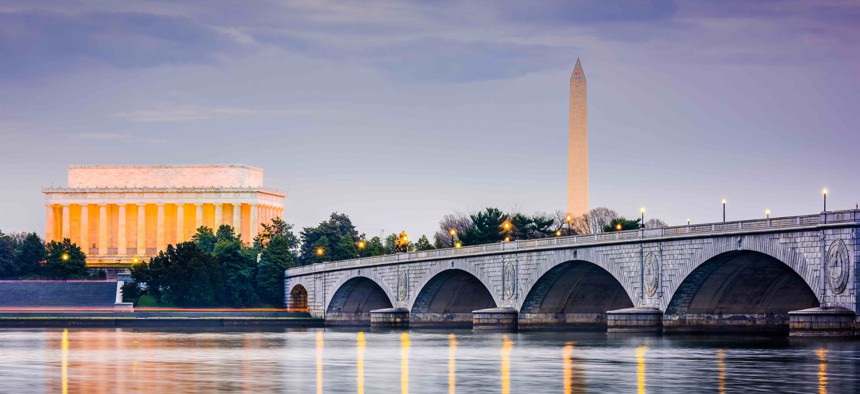D.C. Mayor Argues for Statehood Ahead of Congressional Hearing

Shutterstock
“This is taxation without representation, in practice, in the capital of the free world,” Mayor Muriel Bowser said.
Mayor Muriel Bowser outlined a case on Wednesday for why Washington, D.C. should be recognized as a state, arguing that as things stand more than 700,000 residents are unjustly denied their full-fledged rights as American citizens.
Residents in the District of Columbia pay federal taxes, but lack a voting member in Congress. They do elect a non-voting delegate to the U.S. House, as well as a “shadow” delegation of one representative and two senators, who are relatively powerless on Capitol Hill.
The District government carries out many of the functions that a state would otherwise handle, including issuing licenses and managing federal programs like Medicaid, food stamps and block grants. D.C. is treated as a state under more than 500 federal laws, Bowser noted.
“Washington, D.C. takes on the responsibilities of statehood without enjoying all of the rights and privileges of the United States Constitution,” the mayor said during remarks at Georgetown's law school. “This is taxation without representation, in practice, in the capital of the free world.”
“We are talking about the denial of our fundamental rights as American citizens,” she added. “A denial of rights that causes political and economic harm.”
House Democrats have planned a committee hearing for later this month on D.C. statehood legislation. It’s the first hearing on the topic since 1993, Bowser said.
While D.C. statehood advocates may view the hearing as a positive step, the odds that the Republican-controlled Senate will take up such legislation are slim at best.
Bowser acknowledged the political reality that the District is largely a Democratic enclave, which GOP lawmakers are unlikely to be eager to empower in Congress.
“We have also been, for most of our history, a predominantly African American city,” she added. “Some people don’t want two African Americans, they would think, to be senators.”
With the status quo, the mayor said, District residents are denied a say on Capitol Hill over how federal tax dollars are spent, who sits on the Supreme Court, or when the nation engages in war.
“To add insult to injury,” she added, “Congress can overturn our local laws, block local funding and could even abolish local government.” She noted members of Congress have sought to interfere with district matters ranging from gun regulations to the labeling of wet wipes.
District residents in 2014 voted to legalize recreational adult marijuana possession and use. But a congressionally imposed “rider” has prevented the local government there from establishing a taxed and regulated system for recreational cannabis.
The District’s non-state status yields other governmental anomalies as well.
For example, the U.S. attorney for D.C.—who is appointed by the president, confirmed by the Senate, and not required to live in the district—prosecutes most local crimes, while the locally elected attorney general is limited to prosecuting misdemeanors.
Local courts are run by the federal government. Judges on the D.C. Superior Court also require federal approval, including Senate confirmation. Bowser said that there’s a backlog for confirming these judge positions in the Senate, with five vacancies on the court.
The District’s mayor also lacks the authority that governors have to grant clemency and to deploy the National Guard.
Bowser dismissed arguments that D.C. statehood would be unconstitutional, laying out specific reasons why this would not be the case. She also suggested the idea of folding the District into Maryland was unlikely to win support among D.C. or Maryland voters.
“People in Maryland would be confronted with the very real possibility of having the governor of Maryland be from Petworth,” the mayor said, referring to a neighborhood in the District.
“And I promise you, I would run,” she added.
District voters in November 2016 overwhelmingly backed a non-binding, advisory referendum in favor of splitting the capital into a new state for residents and a district for federal buildings and monuments. The measure passed with 78% of the vote.
All the Democratic members of Maryland and Virginia’s congressional delegations have endorsed D.C. statehood, Bowser said.
Reflecting on the earlier days of Barack Obama’s time as president, when Democrats controlled both houses of Congress, the mayor said she didn’t think that the District was fully prepared at that time to push federal lawmakers to focus on the statehood agenda.
Looking ahead, she said that a goal would be to have D.C. statehood be part of a Democratic president’s first 100-day package at a time when Democrats reclaim control of both houses. “We’ve been laying the groundwork,” Bowser added. “You can see how far we’ve come.”
Bill Lucia is a Senior Reporter for Route Fifty and is based in Olympia, Washington.
NEXT STORY: North Carolina Court Rules Electoral Maps Must Be Redrawn






